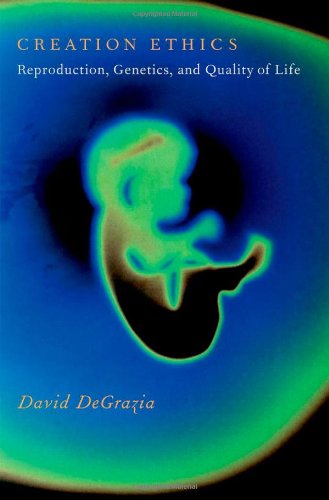مشاهده سبد خرید “An Introduction to Ethical, Safety and Intellectual Property Rights Issues in Biotechnology 2017” به سبد خرید شما اضافه شد.
Creation Ethics: Reproduction, Genetics, and Quality of Life 2012
دانلود کتاب پزشکی اخلاق خلقت: تولید مثل، ژنتیک و کیفیت زندگی
| نویسنده |
David DeGrazia |
|---|
| تعداد صفحهها |
234 |
|---|---|
| نوع فایل |
|
| حجم |
1 Mb |
| سال انتشار |
2012 |
89,000 تومان
دانلود ۳۰.۰۰۰ کتاب پزشکی فقط با قیمت یک کتاب و ۹۹ هزار تومان !
توضیحات
اخلاق خلقت انسان – یا رد خلقت آنها – در چندین زمینه مطرح شده است: بحث در مورد سقط جنین و تحقیقات جنین. ادبیات “خودسازی”؛ و بحث در مورد حقوق و مسئولیت های باروری، مهندسی ژنتیک و نسل های آینده. در اینجا، برای اولین بار، یک تحلیل علمی پایدار از همه این موضوعات وجود دارد – بحثی که وسعت موضوع را با عمق فلسفی، تخیل با درک علمی فعلی، و سختگیری جدلی با قابلیت دسترسی ترکیب می کند. هدف کلی اخلاق خلقت روشن کردن طیف وسیعی از مسائل مرتبط با تولید مثل و ژنتیک از دریچه فلسفه اخلاق است. دیوید دگرازیا با چارچوب های جدید برای درک وضعیت اخلاقی و هویت انسانی قبل از تولد، و انصاف استثنایی در قبال افرادی که نظرات متفاوتی دارند، نور جدیدی بر اخلاق سقط جنین و تحقیقات جنینی، تقویت ژنتیکی و مداخلات ژنتیکی قبل از تولد، تولید مثل و فرزندپروری، و تصمیماتی که بر کیفیت زندگی نسل های آینده تأثیر می گذارد. در این راه، او به کمک نظریه هویت شخصی و نظریه ارزش و همچنین موضوعات پیچیده ای مانند وضعیت اخلاقی، زندگی نامشروع و «مشکل عدم هویت» را معرفی می کند. نتایج شامل یک گزارش ذهنی از رفاه انسان، معیاری برای تولید مثل مسئولانه و فرزندپروری، و یک پل نظری بین نظریههای اخلاقی پیامد و غیرنتیجه است. نتیجه یک دیدگاه نابخرد و عمدتاً لیبرال از اخلاق خلقت است. “این کتاب ارزشمندی در مورد موضوعی جذاب است که توسط یک شخصیت برجسته در این زمینه نوشته شده است. موضوع اخلاق خلقت افراد فوریت عملی دارد، زیرا فناوری های جدید برای شکل دادن به فرزندان انسان توسعه می یابد، و همچنین از نظر نظری علاقه زیادی به اخلاق دارد. و فرااخلاق زیرا به عمیق ترین مسائل می پردازد، از جمله شامل مسائل مربوط به وضعیت موجود اخلاقی، ماهیت عدالت و هویت است. دگرازیا قبلاً ثابت کرده است که نیروی مهمی در شکل دادن به بحث در مورد این موضوعات است. موضوع باید این کتاب را پیش روی خود قرار دهد. سبک آن به طور قابل ملاحظه ای واضح و تقریباً بدون اصطلاحات است. از آنجایی که کتاب مملو از استدلال های پیچیده و مداوم است، این کتاب کاملاً یک دستاورد است. این کتاب مورد توجه محققان حقوقی و فیلسوفانی خواهد بود که در هنجار کار می کنند. – تنظیم اخلاق، فرااخلاق، اخلاق زیستی، و محققان سیاست عمومی.» – آلن بوکانان، استاد فلسفه در جیمز بی. دوک، دانشگاه دوک
توضیحات(انگلیسی)
The ethics of creating-or declining to create-human beings has been addressed in several contexts: debates over abortion and embryo research; literature on "self-creation"; and discussions of procreative rights and responsibilities, genetic engineering, and future generations. Here, for the first time, is a sustained, scholarly analysis of all of these issues-a discussion combining breadth of topics with philosophical depth, imagination with current scientific understanding, argumentative rigor with accessibility. The overarching aim of Creation Ethics is to illuminate a broad array of issues connected with reproduction and genetics, through the lens of moral philosophy. With novel frameworks for understanding prenatal moral status and human identity, and exceptional fairness to those holding different views, David DeGrazia sheds new light on the ethics of abortion and embryo research, genetic enhancement and prenatal genetic interventions, procreation and parenting, and decisions that affect the quality of life of future generations. Along the way, he helpfully introduces personal identity theory and value theory as well as such complex topics as moral status, wrongful life, and the "nonidentity problem." The results include a subjective account of human well-being, a standard for responsible procreation and parenting, and a theoretical bridge between consequentialist and nonconsequentialist ethical theories. The upshot is a synoptic, mostly liberal vision of the ethics of creating human beings. "This is a valuable book on a fascinating topic, written by a major figure in the field. The topic of the ethics of creating people is both practically urgent, as new technologies develop for shaping human offspring, and also of great theoretical importance for ethics and meta-ethics because it engages the deepest issues, including those of moral status, the nature of justice, and identity. DeGrazia has already proved to be an important force in shaping the debate regarding these issues. Anyone writing on this topic will have to address this book head-on. The style is remarkably lucid and almost jargon-free. Given that the book is filled with complex, sustained argumentation, this is quite an accomplishment. This book will be of interest to legal scholars, philosophers working in normative ethics, meta-ethics, and bioethics, and public policy scholars." - Allen Buchanan, James B. Duke Professor of Philosophy, Duke University




